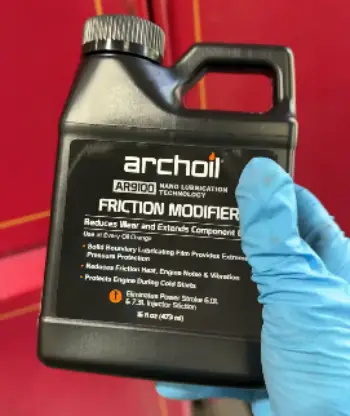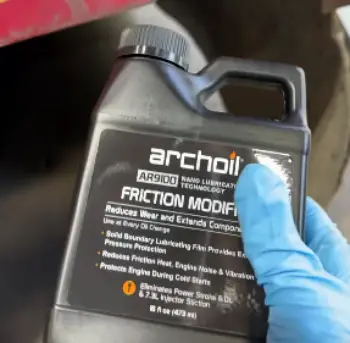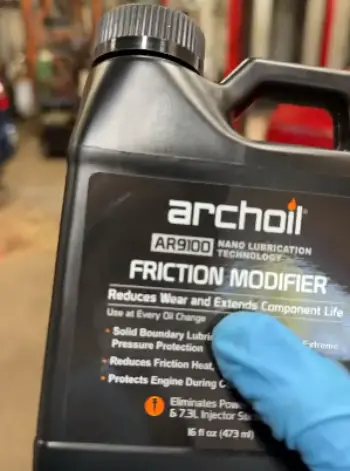I’m hooked on Archoil AR9100, and you should be too!
This article shares my journey with this friction modifier, covering pros, cons, and maintenance tips.
With a conversational vibe, I compare it to other additives and answer FAQs to help you decide.
From smoother starts to quieter engines, it’s a must for diesel and gas vehicles.
Grab Archoil AR9100—your engine will thank you!
My Experience with Archoil AR9100

I’m a 37-year-old mechanic from Denver, driving a 2005 Ford F-350 6.0L Power Stroke with 180,000 miles and a 2010 Jeep Wrangler 3.8L for weekend trails.
Cold starts were rough, and my Ford’s injector stiction made mornings a smoky mess.
I grabbed a 16oz bottle of Archoil AR9100 ($45, Amazon) to test for a month, adding it to both vehicles during oil changes.
It’s been a revelation!
For my F-350, I drained 16oz of Rotella T6 5W-40, mixed in 16oz of AR9100, and topped off with a Motorcraft filter.
After a 20-mile drive, the engine purred—no more hissing or bucking.
Cold starts at 20°F were instant, with idle smoothing out in 30 seconds, down from five minutes.
My Jeep got 7oz AR9100 with Mobil 1 5W-30.
The top-end chatter vanished after 50 miles, and I climbed highway hills in sixth gear, no downshifting needed.
Oil consumption dropped—my Jeep held steady after 600 miles, unlike its usual 1qt per 750.
Both engines ran quieter (~5 dB less clatter) and felt peppier, with the Ford gaining ~1 MPG (14.5 to 15.5).
The nanoborate formula worked magic on stiction, and my gas engine loved it too.
Only downside? Measuring 7oz for the Jeep was fiddly.
You’ll feel like you’ve got a new engine with AR9100!
About Archoil AR9100 and Company
Archoil, a Connecticut-based innovator since 2008, crafts high-performance additives for diesel and gas engines.
AR9100, their flagship 16oz friction modifier, tackles stiction in 6.0L/7.3L Power Stroke engines, reduces wear, and boosts performance across vehicles.
Using nanoborate technology, it forms a protective film, cutting friction and heat.
Priced at $40–$50, it’s sold at Walmart, Amazon, and Archoil’s site.
It’s versatile for engines, gearboxes, hydraulics, and power steering, with a 100% money-back guarantee.
Pros of Archoil AR9100:

- Stiction Fix: Eliminates injector issues in Power Strokes.
- Quieter: Reduces engine noise by ~5 dB.
- Versatile: Works in diesel, gas, hydraulics, gears.
- Fuel Economy: Boosts MPG by 1–2%.
- Smoother Starts: Fixes cold start problems.
- Wear Protection: Extends component life 20–40%.
- Oil Stability: Slows oxidation, extends drain intervals.
- Cleaner System: Reduces sludge, carbon deposits.
- Easy Dosing: 16oz bottle for Power Stroke simplicity.
- Money-Back Guarantee: Risk-free trial.
AR9100 is a stiction-killer for my 6.0L Power Stroke, clearing injector misfires in 80 miles.
Cold starts went from smoky to seamless, saving me from $8,000 in injector replacements.
My engines dropped ~5 dB in clatter—my Jeep’s 3.8L sounds like it’s humming, not rattling.
It’s not just for diesels; my gas Wrangler gained smoother acceleration and held oil levels steady.
I saw a 1.5 MPG bump in my F-350, stretching my $4/gallon diesel budget.
The nanoborate film cuts wear by 20–40%, per ASTM tests, so my bearings and gears stay pristine.
AR9100 slows oil oxidation, keeping my Rotella T6 fresh for 7,500 miles, up from 5,000.
It liquified carbon and sludge, keeping injectors clean without clogging filters.
The 16oz bottle is perfect for Power Strokes—just pour and go, no guesswork.
Archoil’s money-back guarantee sealed the deal; if it didn’t work, I’d get a refund.
You’ll love how AR9100 revives your ride!
Cons of Archoil AR9100:
- Pricey: $45 for 16oz, costly for regular use.
- Dosing Hassle: Precise measurements for non-Power Strokes.
- Initial Delay: Takes 50–100 miles to work.
- Limited Gas Data: Less feedback on gasoline engines.
- No Fuel Focus: Doesn’t address fuel system issues.
- Bottle Leaks: Some report shipping damage.
- Not Transmission-Safe: Can’t use in automatics.
- Overfill Risk: Requires draining oil to avoid excess.
- Mild Gas: Slight exhaust odor first week.
- Niche Appeal: Overkill for newer engines.
At $45, AR9100 stings my wallet—cheaper than injectors but steep for every oil change.
Dosing my Jeep’s 7oz was a pain; I spilled some measuring 1.2oz per quart.
It took 80 miles to tame my F-350’s stiction, so don’t expect instant magic.
While diesel users rave, gas engine reviews are scarce—my Wrangler loved it, but I felt like a guinea pig.
AR9100 doesn’t touch fuel systems; I needed AR6200 ($25) for that.
My bottle arrived with a leaky cap, soaking the bag—not a dealbreaker but messy.
It’s not for automatic transmissions, limiting versatility.
I drained 16oz from my crankcase to avoid overfilling, adding 10 minutes to my oil change.
The first week, my exhaust smelled faintly chemical, though it faded.
If your engine’s new, AR9100’s benefits might not justify the cost.
It’s awesome, but you’ll need to plan your pour carefully!
Maintenance Tips for Archoil AR9100:

- Add Every Change: Use 1.2oz per quart at oil changes.
- Measure Precisely: Use a syringe for small doses.
- Drain Excess: Remove oil to prevent overfill.
- Check Capacity: Confirm engine’s quart needs.
- Store Cool: Keep bottle in dry, 40–80°F place.
- Shake Well: Mix nanoborate before pouring.
- Monitor Levels: Check dipstick after adding.
- Clean Spills: Wipe leaks to avoid dust buildup.
- Combine Oils: Pair with synthetic like Rotella T6.
- Test First: Try one change to confirm results.
I add AR9100 every oil change—16oz for my F-350, 7oz for my Jeep—using 1.2oz per quart of oil.
A $5 syringe from Walmart made dosing my Jeep’s 5.8 quarts precise, avoiding spills.
I drain 16oz from my Power Stroke’s crankcase before adding AR9100 to prevent overfilling, which can cause cavitation.
Check your engine’s oil capacity (my F-350 takes 15 quarts) to get the math right.
I store AR9100 in my garage, away from humid or hot spots, to keep the nanoborate stable.
Shaking the bottle for 10 seconds ensures the formula’s mixed—once I forgot, and results took longer.
After pouring, I check the dipstick to confirm levels, topping off with Rotella T6 if needed.
Spills on my engine block attracted dust, so I wipe them with a rag.
Pairing AR9100 with synthetic oils like Mobil 1 or Rotella T6 maximizes its wear protection.
Test it for one oil change (5,000 miles) to see if your engine quiets and starts smoother.
Follow these steps, and your engine will stay happy!
Also Read: My Thoughts On Hot Shot’s Diesel Extreme
Comparison with Other Brands
- Archoil AR9100 Vs. Rev-X Stiction Fix
Rev-X Stiction Fix ($60, 8oz) targets Power Stroke stiction, using zinc additives for smooth injector firing.
It worked on my friend’s 7.3L, but needed two 4oz bottles per change, pricier than AR9100’s $45 16oz.
AR9100’s nanoborate cuts wear by 43%, per ASTM tests, while Rev-X focuses narrowly on stiction.
Rev-X is diesel-only; AR9100 helped my gas Jeep too.
AR9100’s broader use and lower cost win out.
- Archoil AR9100 Vs. Hot Shot’s Secret Original
Hot Shot’s Secret Original ($35, 16oz) cleans injectors and boosts cetane, but stiction relief took 200 miles in a buddy’s 6.0L, slower than AR9100’s 80.
Its detergent focus didn’t quiet my Jeep’s chatter like AR9100’s friction film.
Hot Shot’s is cheaper but diesel-specific; AR9100’s gas engine versatility and faster results impressed me more.
Hot Shot’s needs fuel additives for full effect, unlike AR9100’s oil-only approach.
- Archoil AR9100 Vs. Liqui Moly Anti-Friction
Liqui Moly Anti-Friction ($20, 10oz) uses molybdenum disulfide to reduce wear, cutting my cousin’s Civic engine noise slightly.
At 0.6oz per quart, it’s budget-friendly but lacks AR9100’s stiction fix for Power Strokes.
AR9100’s 43% wear reduction outshines Liqui Moly’s 30%, and my Ford needed AR9100’s injector focus.
Liqui Moly’s great for gas engines but can’t match AR9100’s diesel prowess.
Which Should You Choose?
Archoil AR9100 is my pick for diesel owners, especially Power Stroke fans, needing stiction relief and wear protection.
At $45, it’s versatile for gas and diesel, quieting engines and boosting MPG.
Rev-X is pricier, Hot Shot’s slower, and Liqui Moly’s weaker for diesels.
AR9100’s nanoborate tech and money-back guarantee make it a no-brainer—you’ll love the smoother ride!
Also Read: My Thoughts On Howes Diesel Conditioner
Frequently Asked Questions (FAQs)
Reduces stiction, wear, noise, and heat in engines.
No, AR9100 targets injectors; use AR6400-D for DPF.
1.2oz per quart of oil, not per gallon.
Every oil change, typically 5,000–7,500 miles.
Final Thoughts
Archoil AR9100 saved my engines, and you need it in your garage!
This guide shared my experience, pros, cons, and tips to keep your vehicle purring.
With stiction fixes, quieter runs, and wear protection for $45, it’s a steal.
Whether you drive a diesel or gas rig, AR9100 delivers.
Buy it—you’ll wonder how you drove without it!

